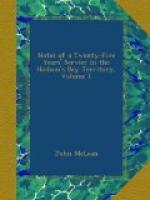As to the North-West Company being guilty of the blood of innocent Indians,—the charge is as false as it is invidious. When the blood of their servants was shed without cause or provocation, as frequently happened when they first encountered the fierce savage, they punished the aggressors as the law of God allows, demanding “blood for blood.” But while the author (or rather his informant, whose ribbon I can plainly distinguish, although he strikes in the dark) so freely censures the North-West Company for avenging the murder of their people, does he mean to insinuate that nothing of the kind is done under the humane and gentle rule of the Hudson’s Bay Company? What became of the Hannah Bay murderers? They were conveyed to Moose Factory, bound hand and foot, and there shot down by the orders of the Chief Factor. Did the murders committed by the natives at New Caledonia, Thompson’s River, and the Columbia, pass unavenged? No! the penalty was fully paid in blood for blood.
But since the author’s informant seems disposed to “rake up the smouldering embers” of days bygone, I shall take the liberty of telling him of a tragedy that was enacted at the ancient date of 1836-7. In that winter, a party of men, led by two clerks, was sent to look for some horses that were grazing at a considerable distance from the post. As they approached the spot they perceived a band of Assineboine Indians, eight in number (if I remember aright), on an adjacent hill, who immediately joined them, and, delivering up their arms, encamped with them for the night. Next morning a court martial was held by the two clerks and some of the men, to determine the punishment due to the Indians for having been found near the company’s horses, with the supposed intention of carrying them off. What was the decision of this mock court martial? I shudder to relate, that the whole band, after having given up their arms, and partaken of their hospitality, were condemned to death, and the sentence carried into execution on the spot,—all were butchered in cold blood!
With the exception of the massacre of the Indians in McKenzie’s River district in 1835, no such deed of blood had been heard of in the country. Yet our author’s impartial informant, perfectly acquainted as he was with all the circumstances of the case, and ready enough as he is to trumpet to the world the alleged crimes of the North-West Company, takes no notice of it! It may be said that the Company are not answerable for crimes committed by their servants without their knowledge. True; but when they are made fully acquainted with those misdeeds, and allow the perpetrators to escape with impunity, the guilt is transferred to their own head; “invitat culpam qui peccatum praeterit.” The proceedings of this court-martial were reported at head-quarters, and the punishment awarded to these murderers was—a reprimand! After this, what protection, or generosity, or justice, can the Indians he said to receive from the Hudson’s Bay Company?




